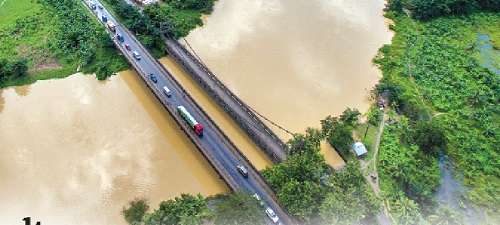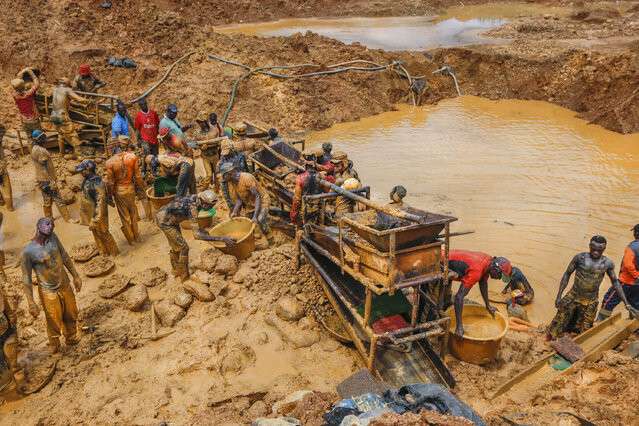The Environmental Protection Agency (EPA) has taken a hard stance against illegal mining, vowing to prosecute all offenders, regardless of status or political affiliation.
At a time when illegal mining—commonly known as galamsey—continues to devastate Ghana’s environment, the agency has reaffirmed its commitment to enforcing environmental laws without fear or favor.
Accordingly, acting Chief Executive Officer of the EPA, Prof. Nana Ama Klutse, emphasized the agency’s dedication to its core mandate: protecting Ghana’s environment from degradation.
“We will focus on our mandate to protect the environment and coordinate all activities that affect it. We need to protect the environment no matter who is involved, whether legally or illegally. So for us, we are focused on our mandate.”
Prof. Nana Ama Klutse
This statement comes amid growing concerns that influential individuals, particularly politicians, may be complicit in illegal mining operations but continue to evade justice.
However, Prof. Klutse dismissed any notion of selective enforcement, stressing that no one would be shielded from legal consequences.
Addressing the perception that politicians involved in illegal mining might be protected, Prof. Klutse made it clear that the EPA would not hesitate to act against any violators. “If any politician is involved in illegal mining, and we get hold of the person, we will still apply the law as we would to any other Ghanaian.”
The EPA, she explained, employs both proactive and reactive approaches to enforcement.
According to her, the agency actively monitors environmental activities while also responding to complaints from communities and companies.

“So far, we have not received any complaints about politicians being involved in illegal mining… If we receive reports from communities or companies, we’ll take the necessary action, including prosecuting offenders who violate compliance regulations.”
Prof. Nana Ama Klutse
Illegal mining has long been a contentious issue in Ghana, with accusations of high-profile involvement and political interference often surfacing.
The environmental damage caused by galamsey is severe, ranging from deforestation and water pollution to the destruction of farmlands and ecosystems.
The EPA’s renewed focus on accountability, therefore, signals a tougher approach that many Ghanaians have long demanded.
Community Engagement: A New Strategy
While enforcement remains a key pillar in the fight against illegal mining, Prof. Klutse stressed the need for stronger community involvement.
She acknowledged that state institutions, including the EPA, the Forestry Commission, the police, and the military, face growing challenges in tackling the menace due to the sheer scale of illegal mining operations.

“We don’t have so many human resources at the EPA to do this work. Only a few of us are out there doing the monitoring. The illegal miners are fully armed, and they attack state authorities when they go around to monitor. We have had staff from the Forestry Commission, police, and even military men suffering these attacks.”
Prof. Nana Ama Klutse
Given these limitations, she believes that empowering local communities to take an active role in combatting galamsey will be more effective than relying solely on government enforcement.
“But we believe that if we go on the dialogue way by getting the community along to fight on our behalf or help in the fight, we should achieve more than we are doing now. It looks like there are more illegal miners than the state institutions or the people who are fighting or controlling it.”
Prof. Nana Ama Klutse
This approach aligns with calls from environmental activists and civil society organizations that have long advocated for grassroots participation in the battle against illegal mining.

By equipping local communities with the necessary tools and support, the fight against galamsey could see greater success.
The EPA’s strong rhetoric signals a more aggressive stance against illegal mining, but whether it translates into real action remains to be seen.
Ghana has seen numerous crackdowns on galamsey in the past, only for the problem to resurface stronger than before.
Prof. Klutse’s insistence that no one, including politicians, will be spared is a bold commitment.
However, it will require political will, adequate resources, and unwavering enforcement to ensure that the law is applied fairly and effectively.
Ultimately, the success of this initiative will depend on whether the EPA can withstand political pressure, strengthen its monitoring systems, and build lasting partnerships with local communities.
If these efforts are sustained, Ghana may finally turn the tide in its long-standing battle against illegal mining.
READ ALSO: US Questions UK’s Free Speech Policies Amid Trial























